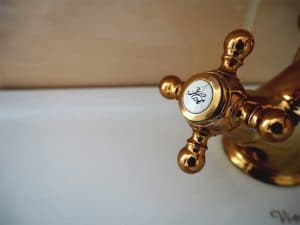There will never be a “good time” for a clogged drain in your home, but there are some clogged or slow-running drain situations that you can handle on your own. Of course, there are other clogs that require professional assistance. Let’s take a look at a few ways that you can try to clear a clogged drain before calling a trusted professional like Team Rooter.
What Causes Clogged Drains?
A clogged drain is usually caused by debris or a foreign object that has become lodged in your drain pipes. It could also be the result of residue or build-up that needs to be flushed away. In most instances, acting quickly with the right tools can save you from a costly (and messy) repair.
Drain Cleaner
One easy way of handling a clogged drain is a bottle of drain cleaner. Pouring it down the drain and allowing it to work might loosen the clog and solve the problem quickly. You should consider that drain cleaner is a chemical, and it should be used with caution to avoid injury.
Vinegar and Baking Soda
If you would prefer a non-chemical solution, you can try vinegar and baking soda to clear your clogged drain. Pour the vinegar first and follow it up with baking soda. In a matter of seconds, the combination will go to work on minor clogs.
Boiling Water
Another way of clearing a clogged drain is pouring boiling water from the stove or a tea kettle down the impacted drain. It might need to be repeated, but it’s the cheapest approach. If boiling water doesn’t work on its own, clear the water from the drain by hand (using a cup or other vessel) and pour salt down the drain, followed by more water. Give it a few minutes to work and try flushing the drain again.
Plunging
Depending on the nature of the clogged drain, you might also consider using a plunger. This technique will require patience and trial and error, but with some elbow grease, you may be able to dislodge the clog without the use of chemicals.
Snaking
One last way of dealing with a clogged drain is using a snake. A snake is a long piece of plastic with grooves or “teeth” cut into it that are designed to grab onto debris. Snaking is particularly helpful in clearing hair clogs in bathroom sinks and shower drains.
For A Stubborn Clogged Drain, Call A Professional!
If you’ve tried some or all of these methods to no success, bring in the pros at Team Rooter. Our team has over two decades of experience clearing clogged drains. We’ll find the problem and work quickly to get your pipes back to working order. We guarantee it. Contact our team to fix your clogged drain today!





